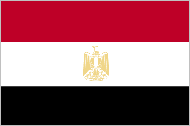Network Policy
Egypt's network policy is focused on Telecom Regulations
and ICT Trade Policy. The
Telecom Regulations sets and enforce telecommunications regulations.
The ICT Trade Policy exists for the economy at large and also
ICT.
Telecommunication Regulations (Stage 3)
Telecom
Egypt, formerly the Arab Republic of
Egypt
National Telecommunication Organization, (ARENTO) is the incumbent
provider of local and international telecommunication networks in Egypt.
Although Egypt Telecom is a wholly-owned government entity, it is now
operating as an autonomous company with control of its own finances and
procurement.
The Ministry of
Telecommunications and Transportation oversees market regulation through
the Regulatory Board for Telecommunications whose mission is to regulate
pricing, standard of services, and develop and implement a national
telecommunications policy. The rulings of the board has not yet
ventured into fundamentally altering the sector by enabling competition
across the full spectrum of communication services and probably delay
until the privatization of Egypt Telecom. The most likely cause of
the delay, other than resistance of the status quo is the direct linkage
between sales price and duration of monopoly under the new owners.
By 1997, the number of
telephone lines had grown nearly ten times from the 1980’s to reach 6.7
million lines. The number of communities with phone access is
concentrated in the cities of Alexandria and the capital, Cairo. The quality of service has
greatly improved with fiber optic technology, and automatic and digital
exchanges.
As part of the strategic
direction to reform the sector and engage
Egypt
in the global information society, Egypt made commitments under the
WTO-BTA (Basic Telecom Agreement) for the liberalization of the telecom
sector in 2002.
This milestone of reform
triggered the following developments toward deregulation:
·
Instant deregulation of the markets of data, Internet, and value-added
services.
·
Full
market liberalization was achieved by the end of 2005.
·
The
deregulation of the mobile services market after the expiration of the
four year exclusivity period granted to the mobile operators in 1998.
·
A
grace period for the deregulation of the international voice market was
granted till the end of 2005.
·
Egypt has adopted a technology neutral approach to
licensing of telecommunications services to allow for innovation.
·
There
are no limitations on foreign capital participation in telecommunication
companies.
·
Licensed international investors are required to participate in the
transfer of technology and development of local industry.
ICT Trade Policy (Stage 2)
Egypt's
foreign policy operates along a moderate line. Factors such as
population size, historical events, military strength, diplomatic
expertise and a strategic geographical
Egypt no longer has a positive trade balance. The trade
deficit reached more than $ 6 billion in 2003. Primary products continue
to dominate the export basket, with very limited diversification. While
the share of manufactures in exports has increased to 35% in 2002, high
technology exports still represented a meager 1% of merchandize exports
in 2002. Capital goods continue to occupy a relatively high share of Egypt’s imports, 21% in 2003. Egypt’s
trade balance in IT is negative. Egypt
also continues to have a high concentration of trade markets between
Europe and the United
States. In 2003, 37% of
Egypt's exports went to the
United States; 34% to the European Union; 35% of
Egypt's imports come from the European Union and
25% from United States. Egypt’s IT trade in particular is mostly with the
United States. This is reminiscent of
Egypt
in the past when most of the trade was with a single country.
In 2003, Egypt joined the WTO Information
Technology Agreement for reducing custom tariffs on ICT related
products. Since 2005, the IT sector has been enjoying a complete
exemption from customs duties on the imports of its production inputs,
such as raw materials and spare parts, in an attempt to both promote the
sector and meet Egypt's commitments to a WTO
Information Technology agreement.
While the commitment of Egypt
was to be implemented in 2005 through successive annual reductions of
tariffs to 0 percent,
Egypt
chose to facilitate the process and remove customs on IT products as a
part of the tariff reform process in 2004. The main objectives behind
this reform were to promote innovation in ICT, increase demand on ICT
products and create more job opportunities.
MCIT and the Delegation of the
European Commission in
Egypt
launched the second phase of the New Approaches to Telecommunication
Policy Program, funded by the European Commission. The second phase of
the New Approaches to Telecommunication Policy Program aims to provide
practical advice to regulatory authorities in ten MEDA countries in
order to assist regulatory authorities with telecommunications
regulatory reform, based on the key principles of the EU regulatory
framework for telecommunications. The meeting focused on developing
regional cooperation between the regulatory authorities of the ten
countries, as well as with the EU.
 Egypt - Readiness for
the Networked World
Egypt - Readiness for
the Networked World